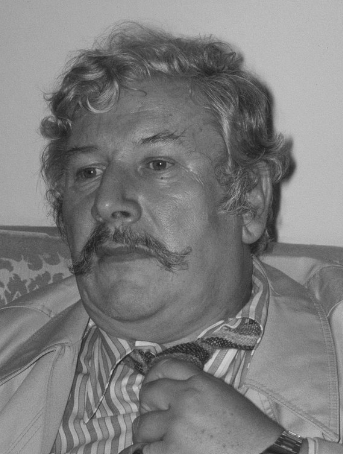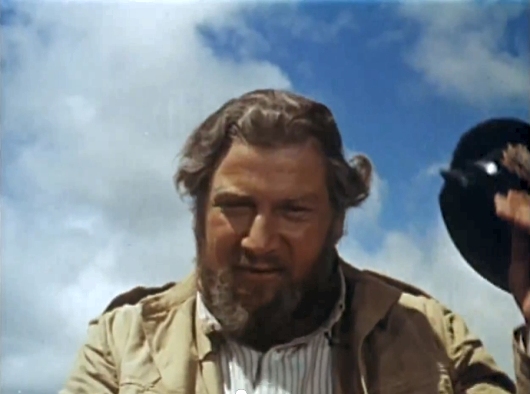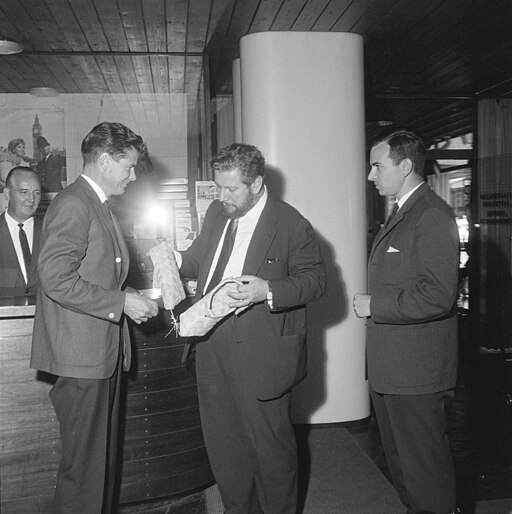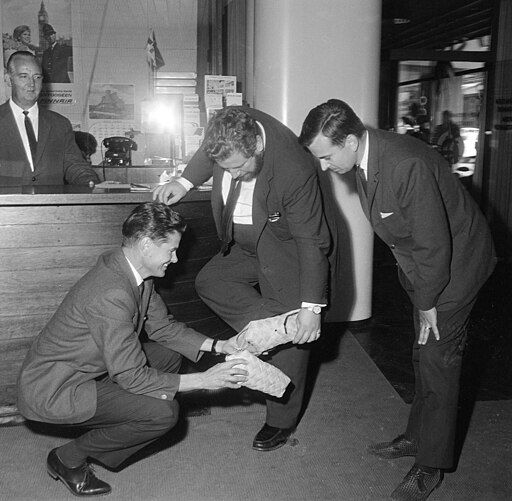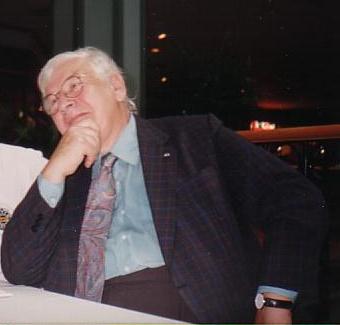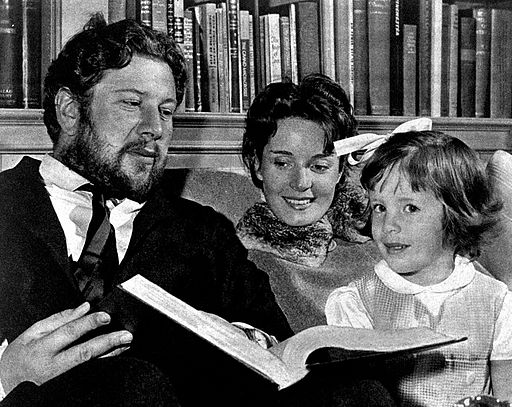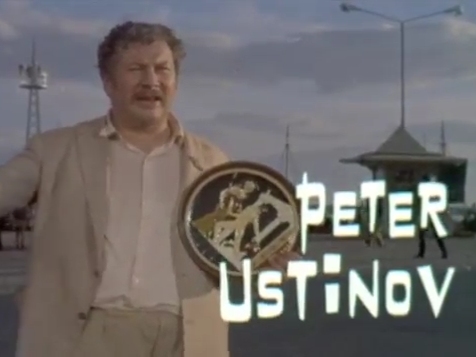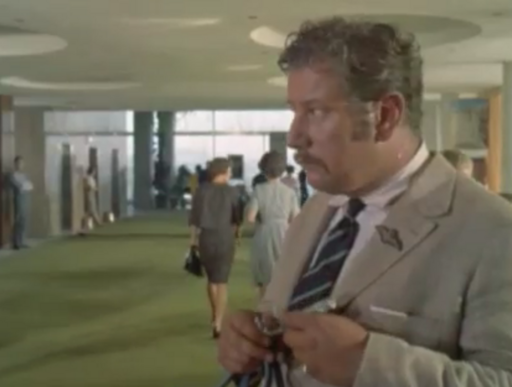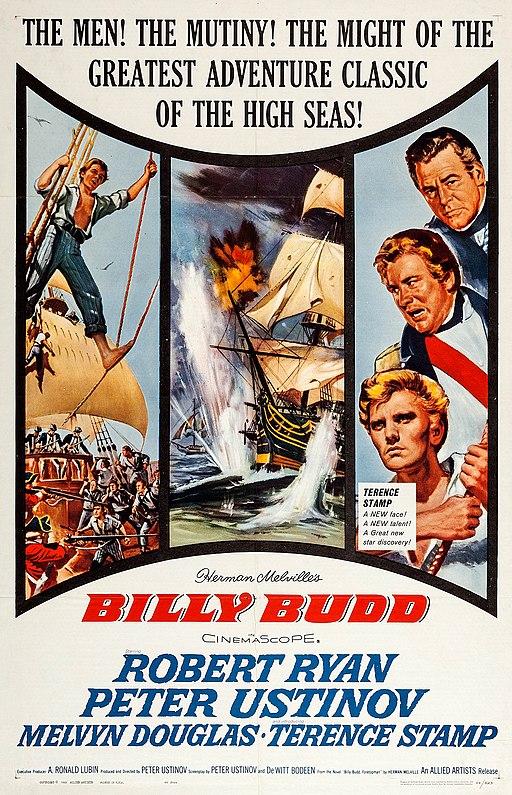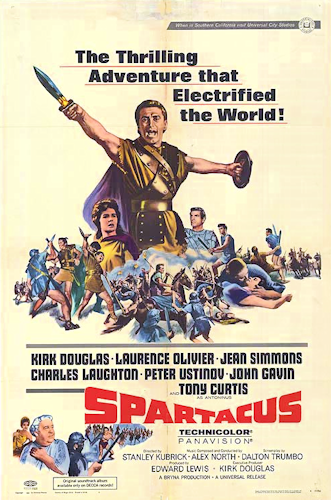Peter Ustinov
back| Full Name | Peter Alexander Ustinov |
| Stage Name | Peter Ustinov |
| Born | April 16, 1921 |
| Birthplace | London, England |
| Died | March 28, 2004 |
| Buried | Orthodox St. Germain Church in Bursinel, Switzerland |
| Married to | Isolde Denham (1940 - 1950) - Suzanne Cloutier (1954 - 1971) - Helene du Lau d'Allemans (1972 - 2004) |
| Children | Tamara - Pavla - Andrea - Igor |
| Notable films | SPartacus (1960) - Topkapi (1964) - Quo Vadis (1951) - Death on the Nile (1978) - Evil Under the Sun (1982) |
Peter Ustinov
Renaissance Man of Hollywood
Sir Peter Ustinov (1921-2004) was a multifaceted British actor, writer, and director known for his versatility and wit. Born in London, he began his career in theatre before making a mark in film. Ustinov's portrayal of Nero in "Quo Vadis" (1951) gained him international acclaim.
A prolific playwright and author, he was recognized for his humor and intelligence. Ustinov's humanitarian work, including his role as a UNICEF Goodwill Ambassador, reflected his commitment to global issues. Knighted in 1990, his legacy extends beyond entertainment to his contributions as a global citizen and intellectual.
Peter Ustinov was often referred to as a "Renaissance man" due to his multifaceted talents and contributions across various fields.
Related
Peter Ustinov
Biography and Analysis of his Movie Career
Early Years and Family Background
- Born: April 16, 1921, in London, England.
- Family: His father, Jona Ustinov, was of Russian and German descent, and his mother, Nadia Benois, was a Russian artist.
- Education: He attended Westminster School and later the London Theatre Studio, where he studied under Michel Saint-Denis.
Path Towards Success
- Early Career: Ustinov began his career in theatre as an actor and playwright. His early works included "House of Regrets" and "The Banbury Nose" in the 1940s.
- Acting Career: He gained fame as a film actor in the 1950s and 1960s, showcasing his versatility in various roles, from comedy to drama.
- Directorial Ventures: Ustinov also directed several films, including "Billy Budd" (1962), which he co-wrote, co-produced, and starred in.
- Writing: Besides screenplays, Ustinov was a successful writer of books and plays. His literary work was marked by humor and satire.
- Recognition: His career was adorned with numerous awards, including two Academy Awards for Best Supporting Actor.
Marriages and Personal Life
- Marriages:
- Isolde Denham (1940-1950)
- Suzanne Cloutier (1954-1971)
- Helene du Lau d'Allemans (1972-2004)
- Children: He had four children - Tamara, Pavla, Andrea, and Igor.
- Passions: Ustinov was known for his love of languages (he spoke several fluently), his humor, and his humanitarian work. He was deeply involved in various philanthropic endeavors, particularly as a Goodwill Ambassador for UNICEF.
Later Years and Death
- Later Career: In his later years, Ustinov continued to act, write, and involve himself in humanitarian efforts.
- Death: He passed away on March 28, 2004, in Genolier, Switzerland.
- Cause of Death: Heart failure.
- Legacy: Ustinov is remembered not only as a versatile actor and filmmaker but also as a witty writer, a respected intellectual, and a dedicated humanitarian.
Peter Ustinov's life was marked by a remarkable breadth of talents and achievements. He left a lasting impact in the fields of cinema, literature, and philanthropy. His legacy continues to be celebrated for its contributions to the arts and society.
Analysis of the Acting Style of Peter Ustinov:
Peter Ustinov's acting style was distinguished by its versatility, intelligence, and a unique blend of humor and depth. Here are key aspects of his acting style:
- Versatility: Ustinov's ability to seamlessly transition between different genres and characters was a hallmark of his career. He could convincingly portray a wide range of roles, from historical figures like Nero in "Quo Vadis" to comedic roles in films like "Topkapi" and "Hot Millions," and the sophisticated detective Hercule Poirot in Agatha Christie adaptations.
- Charismatic Screen Presence: Ustinov had a natural charisma that captivated audiences. He could command a scene with his presence, often bringing a larger-than-life quality to his characters.
- Subtle Humor: Ustinov's performances were often imbued with a subtle, intelligent humor. He had the rare ability to convey humor through small gestures, facial expressions, and a well-timed line delivery, making even serious characters somewhat relatable and human.
- Depth and Complexity: Despite his penchant for humor, Ustinov was equally capable of delivering depth and emotional complexity. His portrayal of complex characters, like Captain Vere in "Billy Budd," demonstrated his ability to convey internal conflicts and moral ambiguities.
- Vocal Mastery: Ustinov was known for his distinctive voice and excellent diction, which he used to great effect in his performances. His ability to employ various accents added to the believability of his characters.
- Intellectual Portrayals: His intelligence shone through in his performances. He often played characters who were witty, sophisticated, and had a certain intellectual aura, reflecting his own well-read and erudite nature.
- Physicality: Ustinov's physicality in his roles was another aspect of his acting. He used his body language effectively to communicate his characters' traits, whether it was the pompousness of a Roman emperor or the meticulousness of a detective.
- Improvisational Skill: Ustinov was known for his ability to improvise, bringing a spontaneous and fresh quality to his performances. This skill made his characters feel more alive and less scripted.
- Empathy and Humanity: Regardless of the role, Ustinov often brought a sense of empathy and humanity to his characters, making them more relatable and multi-dimensional.
- Narrative Engagement: Beyond acting, Ustinov was also a skilled writer and director, which informed his understanding of narrative and character development, often contributing to a richer portrayal of his roles.
In summary, Peter Ustinov's acting style was characterized by a blend of versatility, wit, depth, and a strong intellectual and empathetic understanding of his characters. This unique combination made him one of the most respected and beloved actors of his time.
Compilation of Interviews with Peter Ustinov
In this YouTube video yiu will encounter Peter Ustinov as he will always be remembered, a great man of humor and intellect:
Memorable Quotes from Peter Ustinov:
On Humor and Laughter:
- "Comedy is simply a funny way of being serious."
- "Laughter is by definition healthy."
On Life and Living:
- "The only reason I made a commercial for American Express was to pay for my American Express bill."
- "Unfortunately, a super-abundance of dreams is paid for by a growing potential for nightmares."
On Learning and Knowledge:
- "I imagine hell like this: Italian punctuality, German humour, and English wine."
- "To refuse awards is another way of accepting them with more noise than is normal."
On Love and Life:
- "Love is an act of endless forgiveness, a tender look which becomes a habit."
- "In America, through pressure of conformity, there is freedom of choice, but nothing to choose from."
On Creativity and Art:
- "Creativity is the greatest rebellion in existence."
- "The only way to get rid of a temptation is to yield to it."
On Age and Wisdom:
- "By the time you reach my age, you've made all the stupid mistakes you're going to make, and you remember what the right thing to do was in the first place."
- "Parents are the bones on which children cut their teeth."
On Politics and Society:
- "World leaders are divided into two categories: those who are indispensable and those who are not. The trouble is, they are all indispensable."
- "Terrorism is the war of the poor, and war is the terrorism of the rich."
On Himself:
- "I am an international citizen conceived in Russia, born in England, working in Hollywood, living in Switzerland, and touring the world."
Peter Ustinov Spouses:
Peter Ustinov's personal life, particularly his marriages, was as multifaceted as his professional career. He was married three times:
Isolde Denham (1940-1950):
- Ustinov's first marriage was to Isolde Denham, a British actress and the half-sister of Angela Lansbury.
- This marriage occurred early in Ustinov's career, during his rise in the world of theatre and film.
- The couple had one daughter, Tamara Ustinov, who also became an actress.
- Their marriage lasted for a decade before they divorced in 1950.
Suzanne Cloutier (1954-1971):
- Suzanne Cloutier, a Canadian actress, was Ustinov's second wife.
- They married in 1954, and this period coincided with some of Ustinov's major career milestones, including his acclaimed roles in "Spartacus" and "Topkapi."
- Together, they had three children: Pavla, Andrea, and Igor Ustinov.
- Their marriage lasted 17 years before ending in divorce.
Helene du Lau d'Allemans (1972-2004):
- Ustinov's third and final marriage was to Helene du Lau d'Allemans, a Frenchwoman.
- They married in 1972, and this marriage lasted until Ustinov's death in 2004.
- This period of his life was marked by continued success in film and theatre, as well as his extensive work with UNICEF.
- Helene and Peter did not have any children together.
Notable Movies featuring Peter Ustinov:
1940s
- 1942 "One of Our Aircraft Is Missing": In this British war film, Ustinov plays a priest. The story revolves around the crew of a downed British bomber who try to escape Nazi-occupied Netherlands.
- 1946 "School for Secrets": Ustinov appears in this wartime drama about British scientists working on radar technology during World War II.
1950s
- 1951 "Quo Vadis": Ustinov portrays the Roman Emperor Nero in this historical drama set in ancient Rome during the reign of Nero.
- 1954 "Beau Brummell": He plays the Prince of Wales in this biographical film about the famous British dandy.
- 1955 "Lola Montès": Ustinov portrays Ludwig I of Bavaria in this film about the life of the famous dancer and courtesan, Lola Montès.
- 1957 "The Spies": A comedy where Ustinov stars as a Russian spy.
1960s
- 1960 "Spartacus": Ustinov's Oscar-winning role as Batiatus, a lanista, in this epic historical drama about a slave revolt led by Spartacus.
- 1961 "Romanoff and Juliet": A romantic comedy, directed by and starring Ustinov, set in a fictional European country during the Cold War.
- 1962 "Billy Budd": An adaptation of Herman Melville's novel, where Ustinov plays Captain Vere.
- 1964 "Topkapi": Ustinov won an Academy Award for his performance as Arthur Simon Simpson in this heist film.
- 1965 "Lady L": Ustinov directs and stars in this comedy about an aging aristocrat recalling her adventurous youth.
- 1968 "Hot Millions": A comedy where Ustinov plays a con artist who manipulates computer systems to embezzle funds.
1970s
- 1970 "The Rise and Rise of Michael Rimmer": A satire on modern Britain, where Ustinov plays a manipulative marketing expert.
- 1972 "Hammersmith Is Out": He co-stars in this dark comedy about a psychiatric patient who escapes and plots revenge.
- 1978 "Death on the Nile": Ustinov's acclaimed portrayal of Agatha Christie's detective Hercule Poirot in this murder mystery set on a luxurious Nile steamer.
1980s
- 1982 "Evil Under the Sun": Another appearance as Hercule Poirot, this time investigating a murder at a luxurious island resort.
- 1986 "Dead Man's Folly": Ustinov reprises his role as Hercule Poirot in this mystery based on Christie's novel.
- 1988 "Appointment with Death": His final appearance as Hercule Poirot in an adaptation of Christie's novel set in the Middle East.
1990s and Beyond
- 1992 "Lorenzo's Oil": Ustinov plays a professor in this drama about parents searching for a cure for their son's rare disease.
- 2001 "Victoria & Albert": One of his final roles, Ustinov plays King William IV in this TV movie about Queen Victoria's early reign.
Career Breakthrough wit “Quo Vadis”:
Peter Ustinov's role as the Roman Emperor Nero in the 1951 film "Quo Vadis" was a significant milestone in his career for several reasons:
- Breakthrough Performance: Although Ustinov had already established himself as a talented actor and playwright, his portrayal of Nero was a breakthrough that brought him international acclaim. His performance in "Quo Vadis" helped solidify his reputation as a versatile and skilled actor.
- Critical Acclaim: Ustinov's portrayal of Nero was widely praised for its depth and complexity. He managed to infuse the character, who could easily have been a one-dimensional villain, with a sense of vulnerability and capriciousness. This nuanced performance was recognized as a standout even in a film that featured several other prominent actors.
- Introduction to Hollywood: "Quo Vadis" was one of the early American films in Ustinov's career. His success in this movie opened the doors to more roles in Hollywood productions, allowing him to reach a wider international audience.
- Artistic Challenge: Playing a historical figure like Nero, who was notorious for his tyranny and excess, was an artistic challenge. Ustinov's ability to humanize such a character while still portraying his notorious traits demonstrated his exceptional skills as an actor.
- Genre Versatility: His role in "Quo Vadis," a historical epic, showcased Ustinov's versatility in adapting to different genres. This versatility became a hallmark of his career, as he successfully took on roles in comedies, dramas, mysteries, and historical films.
- Impact on Future Roles: The acclaim and recognition Ustinov received for "Quo Vadis" paved the way for other significant roles in his career, including his Oscar-winning performances in "Spartacus" and "Topkapi."
Awards and Nominations:
Academy Awards (Oscars)
- Winner:
- Best Supporting Actor for "Spartacus" (1961)
- Best Supporting Actor for "Topkapi" (1965)
- Nominated:
- Best Original Screenplay for "Hot Millions" (1969)
BAFTA Awards
- Winner:
- Best British Actor for "The Sundowners" (1961)
- Nominated:
- Best British Actor for "Billy Budd" (1963)
- Best British Actor for "Topkapi" (1965)
- Best Actor for "Death on the Nile" (1979)
- Best Actor for "Evil Under the Sun" (1983)
Golden Globe Awards
- Winner:
- Best Supporting Actor for "Spartacus" (1961)
- Best Supporting Actor for "Quo Vadis" (1952)
- Nominated:
- Best Actor in a Motion Picture – Comedy or Musical for "Hot Millions" (1969)
Emmy Awards
- Nominated:
- Outstanding Single Performance by an Actor in a Leading Role for "Barefoot in Athens" (1967)
- Outstanding Lead Actor in a Limited Series or a Special for "A Storm in Summer" (1971)
- Outstanding Supporting Actor in a Limited Series or a Special for "Jesus of Nazareth" (1978)
Other Notable Awards and Honors
- Grammy Award:
- Nominated for Best Spoken Word Recording for "The Grand Prix of Gibraltar" (1976)
- Berlin International Film Festival:
- Silver Bear for Best Actor for "Billy Budd" (1962)
- David di Donatello Awards:
- Best Foreign Actor for "Topkapi" (1965)
- Laurel Awards:
- Top Male Supporting Performance for "Spartacus" (1961)
- London Critics Circle Film Awards:
- Special Achievement Award (2004)
- UNICEF Goodwill Ambassador:
- Appointed in 1968 for his humanitarian work
Knighthoods and Other Honors
- Knight Bachelor:
- Knighted by Queen Elizabeth II in 1990 for his contributions to drama and the arts.
- Commandeur of the Ordre des Arts et des Lettres (France):
- For his contributions to the arts.
- Other Honors:
- Various honorary degrees from universities worldwide.
Full List of Movies featuring Peter Ustinov:
1940s
- 1940: "Hullo Fame!"
- 1942: "One of Our Aircraft Is Missing"
- 1942: "The Goose Steps Out"
- 1943: "The New Lot"
- 1944: "The Way Ahead"
- 1946: "School for Secrets"
- 1949: "Private Angelo"
1950s
- 1951: "Quo Vadis"
- 1951: "Hotel Sahara"
- 1952: "The Magic Box"
- 1954: "Beau Brummell"
- 1955: "We're No Angels"
- 1955: "Lola Montès"
- 1956: "Alexander the Great"
- 1957: "An Englishman Abroad"
- 1957: "The Spies"
- 1959: "The Journey"
1960s
- 1960: "Spartacus"
- 1961: "Romanoff and Juliet"
- 1962: "Billy Budd"
- 1963: "The Comedians"
- 1964: "Topkapi"
- 1965: "John Goldfarb, Please Come Home!"
- 1965: "Lady L"
- 1967: "The Comedians in Africa"
- 1968: "Hot Millions"
- 1969: "Viva Max!"
1970s
- 1970: "The Rise and Rise of Michael Rimmer"
- 1970: "Hammersmith Is Out"
- 1972: "Up the Front"
- 1973: "Robin Hood"
- 1975: "One of Our Dinosaurs Is Missing"
- 1975: "Logan's Run"
- 1976: "Treasure of Matecumbe"
- 1977: "The Purple Taxi"
- 1978: "Double Murder"
- 1978: "Death on the Nile"
- 1979: "Tarka the Otter"
- 1979: "Ashanti"
1980s
- 1980: "The Thief of Baghdad"
- 1981: "Charlie Chan and the Curse of the Dragon Queen"
- 1982: "Evil Under the Sun"
- 1982: "Grendel Grendel Grendel"
- 1983: "Thirteen at Dinner"
- 1984: "Memed My Hawk"
- 1985: "Dead Man's Folly"
- 1986: "Murder in Three Acts"
- 1987: "The Secret Identity of Jack the Ripper"
- 1988: "Appointment with Death"
1990s and Beyond
- 1991: "There Was a Castle with Forty Dogs"
- 1992: "Lorenzo's Oil"
- 1994: "The Phoenix and the Carpet"
- 2001: "Victoria & Albert"
- 2003: "Luther"

